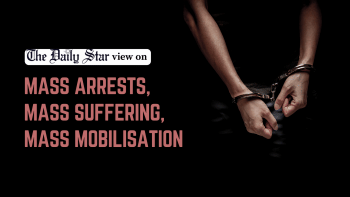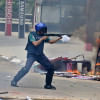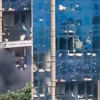We must turn back from further violence

The continuation and, indeed, re-escalation of violence—which has led to at least 90 people getting killed and thousands injured on Sunday—is pushing the country towards a grave danger. Violence, one may recall, first broke out in mid-July when the student wing of the ruling party attacked student protesters of the quota reform movement. Then we saw law enforcers being used to suppress their protests. Even though such incidents declined after massive casualties, and the government indicated its willingness to pursue a path of dialogue more recently, Sunday's events suggest that the latter can just as easily turn back to the path of force. In addition to the killing of ordinary people, the killing of police personnel and attacks on ruling party members' houses indicate that the violence is taking on a different colour now. This may escalate into a civic conflict with very ominous consequences.
We believe the prime minister's invitation for dialogue, regardless of the crisis of faith facing her government, was the wiser path to try and resolve the crisis. But Sunday's events represent a complete U-turn from that and towards the use of force from both sides. But embracing violence, no matter the cost. cannot be an acceptable approach. This violent reaction will only lead to more resentment, destruction, injuries, and deaths. Therefore, the ruling party's decision to resort back to the use of brute force, particularly using its student wings, is not only illegal, but also counterproductive.
It was only on Saturday that we saw a most massive gathering of protesters in Dhaka. They were quite vocal, united in their demand, and still fully peaceful. The very next day, we saw ruling party affiliated men taking to the streets with sticks, rods, machetes and, in some cases, firearms. It seems as if they were intentionally placed to face off against the protesters, and ignite confrontations.
The ruling party has the right to peacefully demonstrate its strength, but under no circumstances should that show of strength be done with the use of violence. If it truly wants to reduce tensions, why create a situation where there is a guaranteed face-off between its supporters armed with deadly weapons and the protesters? Why would they fire live ammunition? Ruling party supporters could have easily gathered somewhere else, instead of taking position where the protesters were and attacking them. Such tactics raise questions regarding the government's declaration that it does not want conflict but would rather have a peaceful resolution. From what we witnessed today, it is the presence of ruling party members that caused the bloody conflicts.
These events show that the country is becoming a battleground with no restraint, particularly from the security forces deployed. This will create much deeper divisions that could prove impossible to mend in the future. That is an extremely dangerous path to embark on. At this point, further use of force would be most detrimental for the whole nation. We strongly call on the ruling party to withdraw its members from the streets, and for both sides to avoid a head-on collision and instead come to the negotiating table for a peaceful settlement. That is the only way to prevent further deaths and injuries.


 For all latest news, follow The Daily Star's Google News channel.
For all latest news, follow The Daily Star's Google News channel. 











Comments